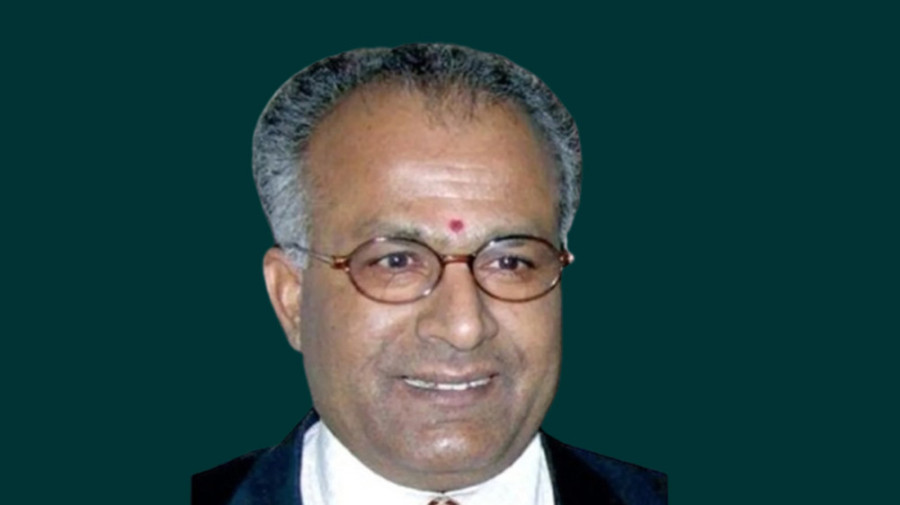National
Hearing on case against prime suspect in refugee scam begins today
Bechan Jha’s refusal to take polygraph test heightens concerns over his role in the scam, police say.
Purushottam Poudel
Hearing on the case against Bechan Jha, filed by the District Public Prosecutor's Office in the Kathmandu District Court on Tuesday, is set to begin on Thursday. Jha, a prime suspect in the high-profile Bhutanese refugee scam, faces charges of cheating, forgery, state fraud, and organised crime.
“Today, the court recorded Jha's statement, and the hearing will start on Thursday,” said a lawyer at the District Public Prosecutor’s office.
Nepal Police, which has been investigating the scam for over a year, arrested Jha on June 28.
Santosh Raj Katwal, an officer with the District Public Prosecutor’s Office, filed a supplementary case against Jha.
“A case has been filed against Jha similar to those of previous defendants who were arrested and charged with fraud for falsifying identities to send individuals to the US as Bhutanese refugees,” Katwal told the Post.
The government is calling for Jha to be punished for multiple offences. The indictment states, “Since it is apparent that he has committed several offences in a single, organised and planned incident, additional punishment should be given in accordance with Section 43 (1) of the National Penal (Code) Act 2017.”
Earlier, in a statement to the police, Jha had claimed: “I have no knowledge about Bhutanese refugees [scam].” Jha had also denied his affiliation with any political party and said he did not know Teknarayan Pandey, the former home secretary implicated in the scam.
During the investigation, police found a cheque for Rs20 million issued in Jha’s name by another suspect, Ramsharan KC. Jha denied any knowledge of this transaction. In a further twist, investigators presented an audio recording of a conversation between Jha and KC, but Jha insisted that the voice on the recording was not his.
However, according to statements collected from other defendants, Jha received a cheque for Rs20 million from Ramsharan KC, claiming that the money would be used to secure the endorsement of a forged document on Bhutanese refugee resettlement through the Council of Ministers.
Jha, in his statement, has stressed, “I am not aware of the cheque for Rs20 million.”
The report submitted by the District Police of Kathmandu to the District Public Prosecutor mentions that Jha declined to take a polygraph test. According to the Kathmandu District Police Office, Jha's refusal to undergo the test has heightened further concerns over his role in the scam.
When the police attempted to administer a polygraph test, Jha refused to participate, according to Dan Bahadur Karki, spokesperson for the Nepal Police.
“The accused can refuse a polygraph test, but that does not stop the case from proceeding,” Karki told the Post. “More details about his involvement in the scam will emerge in court, as the case now has been filed in the district court.”
Senior inspector of Nepal Police, Anju Kandel, who works in the polygraph branch of the police headquarters, reported to the Kathmandu District Police Office that Jha refused to take the polygraph test.
A report documenting Jha's reluctance to take the polygraph test has been included in the case against him filed in the District Court of Kathmandu, says the police officer.
On June 16 last year, the Kathmandu District Court ruled that 16 people, including former deputy prime minister Top Bahadur Rayamajhi and former home minister Bal Krishna Khand, should be jailed after a hearing in the fake Bhutanese refugee scam case.
Along with Rayamajhi, who was also the secretary of the CPN-UML, and Nepali Congress senior leader Khand, home secretary Pandey, former home minister Ram Bahadur Thapa’s security adviser Indrajit Rai, Khand’s personal secretary Narendra KC, former Congress lawmaker Aang Tawa Sherpa, and Bhutanese refugee leader Tek Nath Rizal, among others, were sent to judicial custody following the court's decision.
Khand and Rizal were later released on bail.
The United Nations High Commissioner for Refugees closed the third-country resettlement of Bhutanese refugees in December 2016 after most of the refugees left for Western countries.
In 2019, the government led by KP Sharma Oli, had formed a task force under then joint secretary Bal Krishna Panthi to recommend ways to manage the Bhutanese refugees who remained in Nepal after the third-country resettlement programme ended.
The task force submitted a report that included 429 Bhutanese refugees who had been left behind. Later, the racketeers, in collusion with some top government officials, prepared another report and fraudulently added hundreds of others people to the list of refugees.
The scam came to light after many individuals, mostly Nepalis, who had paid the racketeers large sums to be included in the Bhutanese refugee resettlement programme, were unable to go to the US and subsequently lodged complaints with the police and reported the matter to the media.
Several media reports suggest Jha is one of the kingpins of the scam with connections to powerful politicians in Nepal. He reportedly possesses citizenships of both Nepal and India.




 8.67°C Kathmandu
8.67°C Kathmandu















